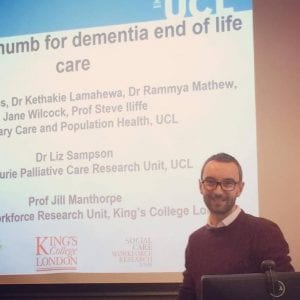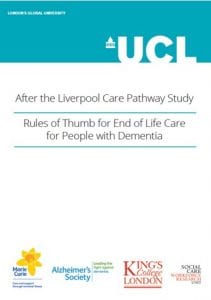Dementia the leading cause of death in England and Wales?? What is really going on?
By Nathan Davies, on 29 November 2016
 This month Nathan Davies talks for the NIHR School for Primary Care Research about the news that dementia is now the leading cause fo death in England and Wales, and explains about some of the factors which may be underlying this revelation.
This month Nathan Davies talks for the NIHR School for Primary Care Research about the news that dementia is now the leading cause fo death in England and Wales, and explains about some of the factors which may be underlying this revelation.
Last week we saw the Office for National Statistics announce that Alzheimer’s Disease and other dementias have become the leading cause of death in England and Wales. It has replaced heart disease, with 61,686 out of 529,655 recorded deaths last year in England and Wales. Now this sounds all very alarming, but actually we know from recent studies that the incidence of dementia is falling. However, our population is ageing and therefore the prevalence of dementia is increasing. All a bit muddy.
But, why are we seeing dementia now as the leading cause of death? There are many reasons as to why this number has increased. We have seen an improvement in the diagnosis of dementia across the country, including the inclusion of dementia diagnosis in Local Enhanced Services in Primary Care. In addition to this doctors are now much more likely to record dementia as an underlying cause of death on death certificates and not simply record pneumonia for example.
Regardless of all the factors which lie behind this news, dementia is one of the biggest health concerns facing older people, and the health and social care systems. There is no cure or disease modifying treatment for dementia as yet and only this week we saw that a drug (solanezumab) which sounded promising last year, has been reported as unsuccessful in delaying or slowing down the progression of Alzheimer’s Disease.
With no known cure it is vital that not only does research into treatment, cure and prevention continue, but also that care based research continues. As a School the NIHR School for Primary Care Research currently funds many dementia care pieces of research, and I am fortunate enough to receive some of this funding.
My work at UCL focusses on end of life care for people with dementia. As part of this work I am exploring the support and challenges that family carers of people with dementia face at the end of life. Families provide the majority of support to people with dementia and it is vital that they are supported too. Our study CADRE is developing a website to provide support for family carers when caring for someone with dementia at the end of life. We are still in the development stages of our study and building our prototype website, but keep an eye out as we will soon report what we think a website needs to include and how this should look! Initial suggestions include elements of networking and social interaction, including a function to identify other carers in the local area.
 Our other study ‘After the Liverpool Care Pathway: What next for people with dementia?’, which has recently come to an end has developed a series of rules-of-thumb for practitioners providing end-of-life care for people with dementia. Our rules-of-thumb cover the core and most difficult decisions facing a practitioner at the end-of-life: eating/swallowing difficulties, providing routine care, reviewing treatment and interventions, and agitation and restlessness. The rules-of-thumb provide a practical toolkit for making decisions and make the implicit knowledge which has been built up over a number of years explicit. Potentially, this is a great method for training junior staff and those less experienced who work with people with dementia at the end-of-life, but it also provides practical and on-the-job assistance. The toolkit has been taken up by the Alzheimer’s Society who are currently looking at ways to implement it in their training packages.
Our other study ‘After the Liverpool Care Pathway: What next for people with dementia?’, which has recently come to an end has developed a series of rules-of-thumb for practitioners providing end-of-life care for people with dementia. Our rules-of-thumb cover the core and most difficult decisions facing a practitioner at the end-of-life: eating/swallowing difficulties, providing routine care, reviewing treatment and interventions, and agitation and restlessness. The rules-of-thumb provide a practical toolkit for making decisions and make the implicit knowledge which has been built up over a number of years explicit. Potentially, this is a great method for training junior staff and those less experienced who work with people with dementia at the end-of-life, but it also provides practical and on-the-job assistance. The toolkit has been taken up by the Alzheimer’s Society who are currently looking at ways to implement it in their training packages.
Although the prevalence of dementia is increasing, and it is now the leading cause of death, it is important to realise, as a research community particularly within primary care and the School, that we are conducting timely studies in an effort to help health and social care practitioners, carers and those affected by dementia.
 Close
Close

